Thanks for your support! If you make a purchase using our links in this article, we may make a commission. And, as an Amazon Associate, I earn from qualifying purchases. See the full disclosure here.
When you live in a campervan, one of your biggest expenses is going to be gas. Plus, your fuel economy will decide how far you can go without needing to stop and fuel up. Let’s take a look at the 5 most fuel-efficient campervans. We’ll also see what exactly affects fuel economy and ways to maximize yours.
Of course, tons of stuff will affect your exact mileage, like your rig’s overall weight, the way you drive, and more. But still, some campervans come out ahead of the rest.
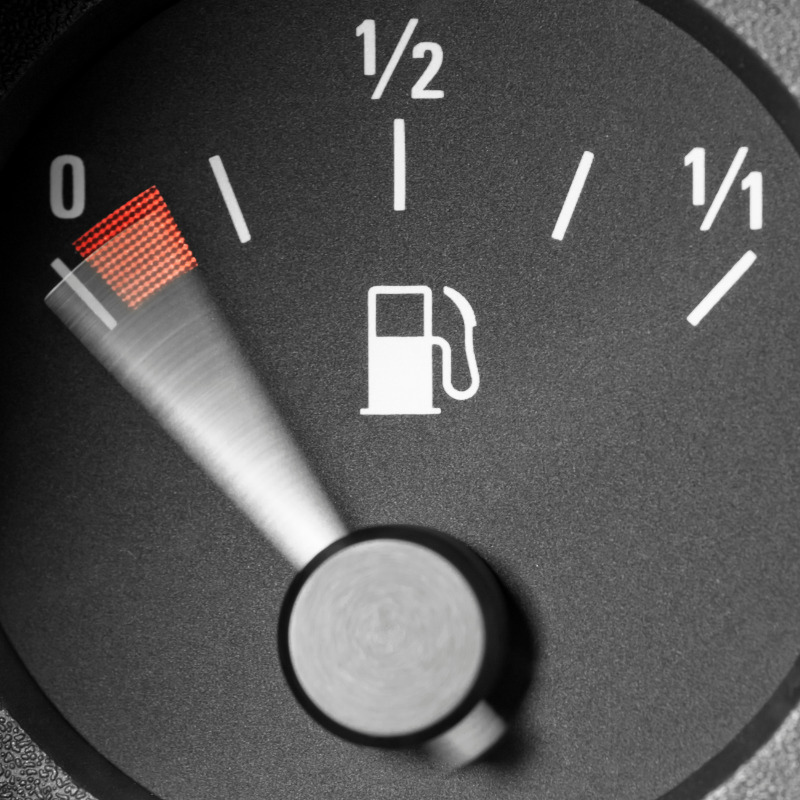
What Gas Mileage Can You Expect From a Fuel-Efficient Campervan?
Before we talk about the campervans with the best gas mileage, let’s look at the gas mileage you can expect from a fuel-efficient campervan. Overall, campervans (that is, Class B RVs) are much more fuel-efficient than other drivable RV categories. This is because they’re both smaller and more aerodynamic.
There’s a sizable range you’ll see for campervan gas mileage. Some get as low as 14 miles to the gallon, while others report numbers as high as 25 miles per gallon.
Most newer vans will fall somewhere in the middle of this range, around 17 to 20 miles per gallon. For example, Camper Report’s guide to motorhome gas mileage lists 7 vans in their Class B section, of these: one gets 17mpg; one gets 18mpg; three get 19mpg; two get 20mpg.
5 Campervans with the Best MPG
Now that we know what’s typical for campervans, let’s see which campervans get the best mpg. These 5 vans are the most fuel-efficient campervans you’ll find.
1. Sportsmobile Sprinter Penhouse Pop-Top
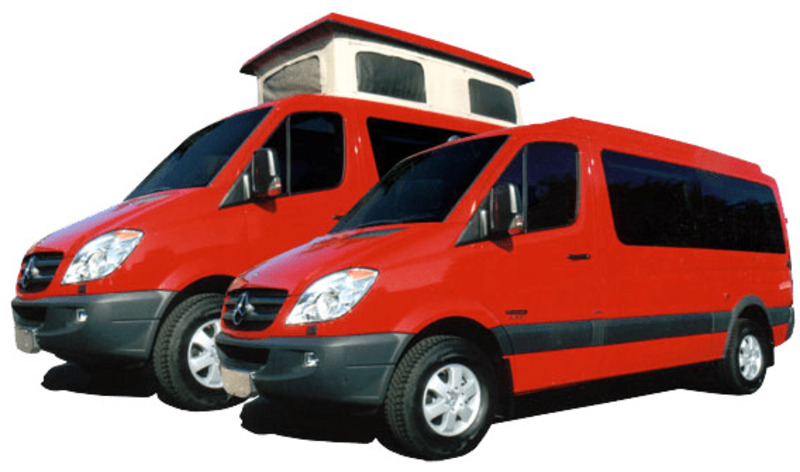
Get upfront price offers on local inventory.
Sportsmobile’s van conversions date back to 1961, beginning with the original VW Type 2 Kombi and Ford Ecolonline. While most American Class B motorhome RV manufacturers use the 3.0L V6, Sportsmobile has plenty of floorplans for the diesel-sipping 2.0L inline 4 engine. At 12 city/24 highway, you can make this modern-day motorhome a tribute to the one that started it all in the late 1940s.
The Sportsmobile Sprinter Penthouse Pop-Top is unique to this campervan maker. They are the only American company authorized to install pop-tops on the Sprinter, without voiding the warranty. It’s possible to add it to the 2.0L inline 4 Sprinter, but know that you’re giving up 300 pounds for the extra space.
2. Roadtrek SS Agile
Get upfront price offers on local inventory.
The Roadtrek SS Agile is another smaller campervan. Just like the Interstate 19, it’s based on a Mercedes Sprinter with a short wheelbase.
Roadtrek advertises “great fuel economy,” but doesn’t give any solid numbers. But, based on the weight and the van base, you should get at least 20 mpg. Since 1974, Roadtrek has been North America’s leading name in Class B Motorhomes. As a subsidiary of Groupe Rapido (Europe’s biggest RV manufacturer), you can feel confident in this campervan build and partnership.
3. Winnebago Travato
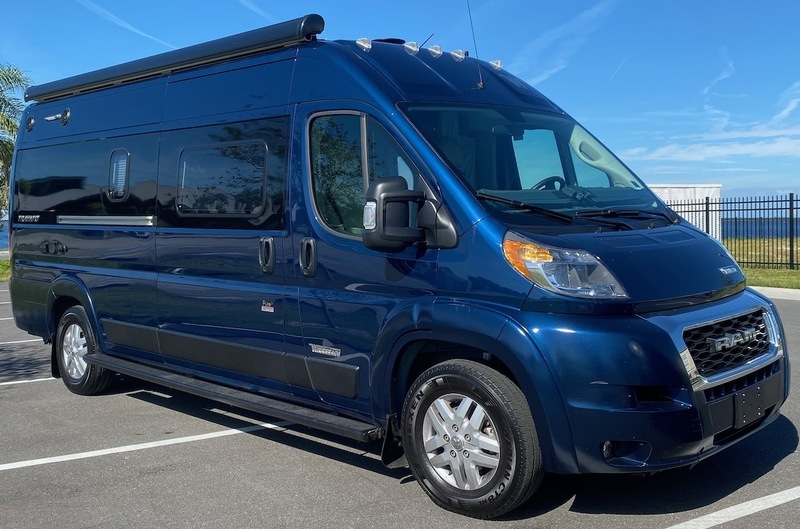
Get upfront price offers on local inventory.
The Winnebago Travato is one of the most fuel-efficient campervans in the Flying W’s selection of Class B motorhomes. Some of their campervans use the Sprinter, but you can’t discount the advantages of the Ram ProMaster chassis.
The Travato is reported to get a combined 23 miles to the gallon. It uses Chrysler’s legendary 3.6L V6 Pentastar engine, Chrysler’s drivetrain, and its frame comes from Fiat’s French Ducato van.
It’s this combination of American and European engineering that makes the ProMaster one of the best fuel-efficient V6 vans on the road. Add Winnebago’s decades of ingenuity, and you have a spacious, fuel-efficient campervan full of features.
4. Thor Motor Coach Compass AWD B+
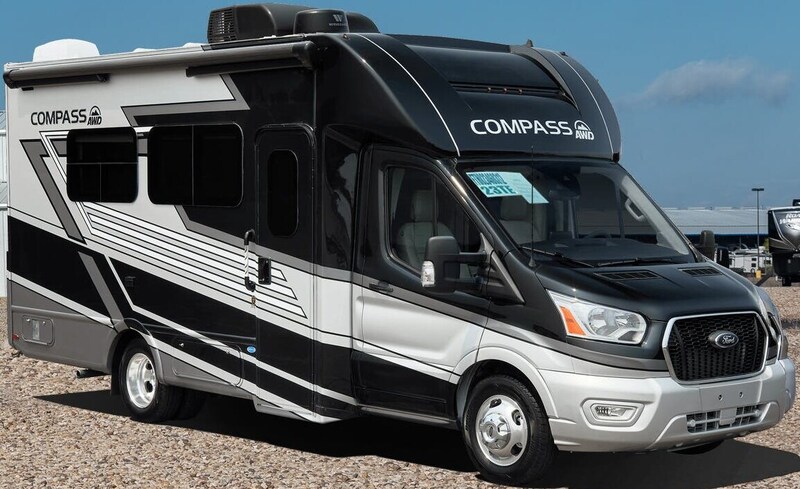
Get upfront price offers on local inventory.
If you’re looking for a little more room to rumba, you can’t forget the B+ campervans. Thor’s Compass uses the all-wheel-drive Ford Transit 3.5L V6 EcoBoost engine. The van has a 15 city/19 highway mpg rating, but it balances fuel efficiency and power.
The Compass comes with a 25-gallon fuel tank, a 5,000 lb. towing capacity, and a 31-gallon freshwater tank. The bigger features inside make long RV trips comfortable for those that need a vehicle that’s maneuverable.
5. Storyteller Overland Beast MODE 4×4
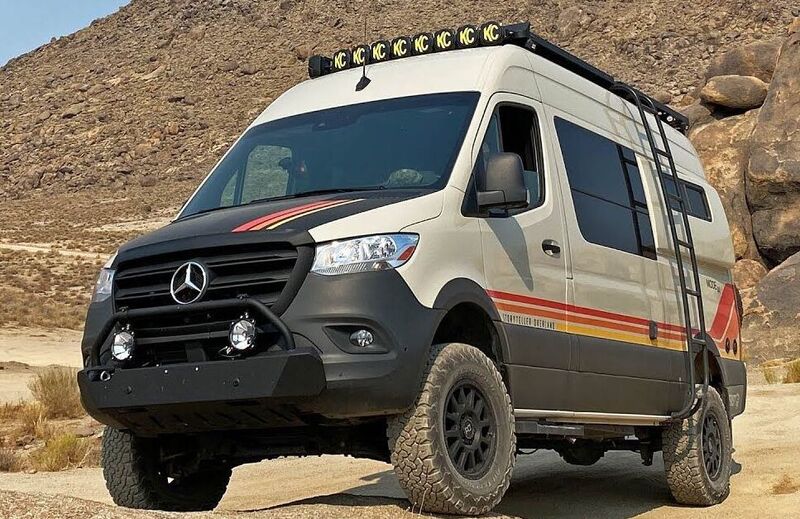
Get upfront price offers on local inventory.
Have you considered an expedition vehicle with the best fuel economy? Storyteller Overland starts with the 3.0L V6 diesel Mercedes-Benz Sprinter 4×4 from the factory. They help this cub realize its full potential by refitting it with the best features to go full Beast Mode on virtually any terrain on Earth.
Despite the exterior and interior transformation, the off-road campervan gets 21 city/24 highway mpg from its 24.5-gallon fuel tank. It may be a lean, mean, conquering machine, but when you hit the gas pedal, that diesel engine will growl.
What Affects Campervan Gas Mileage?
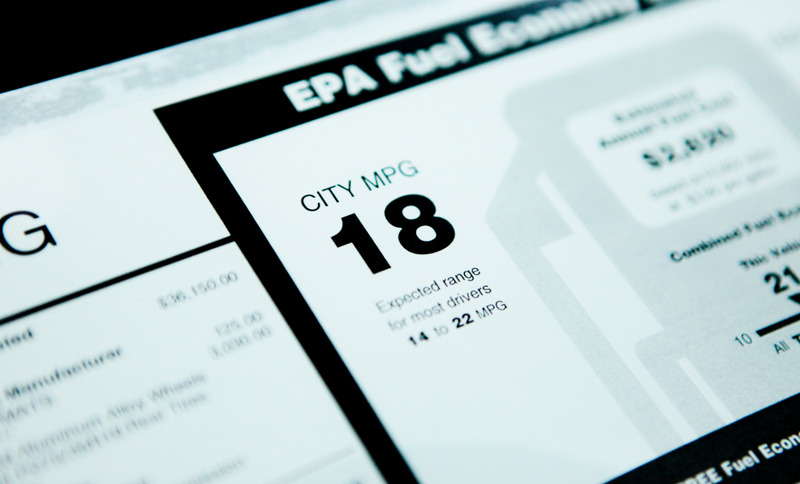
There are five main factors that affect your campervan’s gas mileage:
- Size of your van
- Weight of your van plus all your belongings
- Shape of the campervan
- Fuel type
- Driving conditions
The size of your campervan affects your fuel economy in two main ways. First, a larger vehicle is going to be less aerodynamic. There’s a reason the fastest cars are small and flat instead of big and tall!
But more importantly, a bigger rig will also weigh more. Per the EPA, every 100 pounds makes you 1% less fuel-efficient. This is the main reason that Class B RVs are the most fuel-efficient, while the big bus-like Class A’s are the least efficient. Size matters.
Of course, your van’s size isn’t the only thing making it heavy. Everything inside and outside your van contributes to the weight as well. A fully-loaded van is going to be heavier and thus, less fuel-efficient than a more minimalistic one.
Your van’s shape will also affect gas mileage. Another reason that Class A’s are less fuel-efficient is that they have a flat front and long sides. This creates drag on the vehicle, reducing the efficiency of the engine.
Campervans are much more aerodynamic by comparison. Most modern campervans have about the same body shape, so aerodynamics don’t vary much between them. But, you can maximize aerodynamics by avoiding things like roof racks and by keeping windows rolled up.
As a side note, this may be why the now-discontinued Nissan NV has much worse gas mileage than other vans. This distinctive-looking van resembles the front of a truck stuck to the back of a cargo van. And it only gets a dismal 15mpg, perhaps in part due to its awkward shape.
The next factor is whether you have a gas or diesel engine. Fuel type makes a big difference when it comes to fuel efficiency. Yet, when it comes to distance versus strength, there’s a reason automakers continue to use diesel and gas engines.
The final factor is the one you probably have the most control over – where and how you drive. Maintaining a consistent speed goes a long way in increasing fuel economy, as do other good driving habits. Sticking to dry, well-maintained roads when you can also help.
Mercedes Sprinter vs. Ram ProMaster vs. Ford Transit Gas Mileage
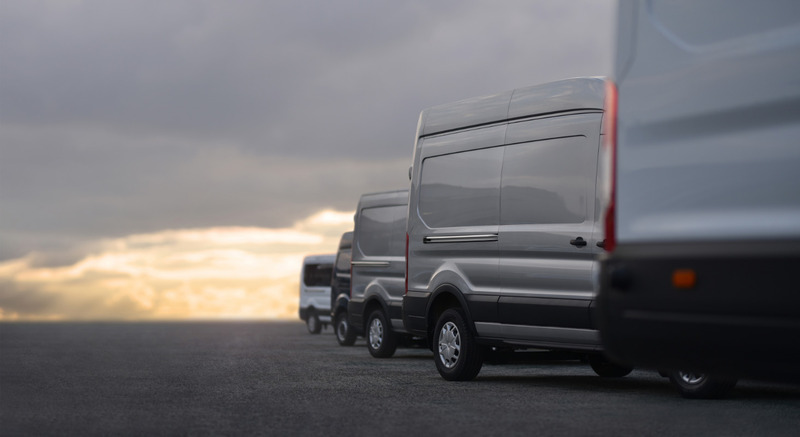
When looking at campervans, you’ll notice there are three main types of van chassis used. The vast majority of campervans today are based on the Mercedes-Benz Sprinter, the Ram ProMaster, or the Ford Transit.
It can be hard to get solid gas mileage numbers for these vans. Plus, each comes in multiple configurations, like a longer chassis or higher roof, which will affect fuel economy. And of course, your final van build will also affect your miles per gallon. However, we can still make some general comparisons.
The Mercedes Sprinter has long been considered the most fuel-efficient campervan of the three. And there’s some data to back that up; according to Car Indigo, the Sprinter gets 22mpg combined. On the highway, it gets a whopping 24mpg!
The fuel efficiency doesn’t change between the three different engines in the Sprinter. In order to do this, Mercedes fits the appropriate size fuel tank with the engine to keep the specs the same. So if you have the slightly less fuel-efficient gas engine, the size of the tank levels it out.
- 2.0L Inline 4 Diesel- 22 gallon tank
- 2.0L Inline 4 Gas- 24.5 gallon tank
- 3.0L V6 Diesel- 24.5 gallon tank
However, the Sprinter might not actually be the most efficient. Momentum compared 2020 EPA data and driver reports to create a comprehensive comparison of cargo vans’ gas mileage.
Momentum gave the diesel engine Sprinter an impressive average fuel economy of 21mpg. But it’s actually the diesel engine Ford Transit that edges out the Sprinter with 22mpg. Meanwhile, the Ram ProMaster, which as of 2020 only comes in a gasoline engine version, gets a measly 16.5mpg.
Diesel vs. Gas Campervan Fuel Efficiency
You might have noticed that the most fuel-efficient campervans all have diesel engines. This is because, pound-for-pound, diesel engines are more efficient than gasoline.
For one, diesel fuel simply contains more energy than gasoline. While the exact number varies, diesel has about 15% more energy than gas on average. That means a gallon of diesel can take you further than a gallon of gas.
On top of that, diesel engines are more efficient than their gas counterparts. This is in part because they use a lower ratio of oxygen to fuel, allowing the engine to produce more energy.
One last note in the gas versus diesel debate is the cost of fuel. Currently, diesel is more expensive than gasoline. However, because diesel is more efficient, it can still be more cost-effective. Although you’ll pay more for a gallon, that gallon will take you further.
Another thing to note is that fuel prices fluctuate constantly. While diesel is more expensive right now, gasoline could become more expensive in the future. The price of fuel shouldn’t be a major factor in deciding on a gasoline or diesel engine. There is also a chance of a diesel shortage, which would greatly affect the price.
Why Choose a Gas Campervan?
Choosing a gas campervan isn’t a bad decision. There are overall advantages that are practical to daily life. In some cases, many of the benefits outweigh the 2-3 mpg differences.
Unleaded gasoline is generally less expensive and easier to find in the U.S. Finding parts for maintenance or repairs is much simpler since you can find them almost anywhere (especially with the Ford and Dodge vans). There’s also the added bonus of not dealing with the DEF fuel additive (if you knew its primary ingredient, you’d smile even more).
Campervans do fall into the same issue that Class A and C motorhomes have. Diesel parts last longer but are more expensive. Gas engine parts break down a little more often but are cheaper to fix.
Yet if you look at the campervan category as a whole. You’ll notice that the Sprinter and ProMaster are favored in the Class B sector. The Ford Transit, which has high horsepower and torque, gets used in heavier campervans, the B+, and small chassis Class C motorhomes.
6 Ways on How to Get the Best MPG in Your RV or Campervan
Wondering how to get the best MPG in your RV or campervan? There are a few things you can do to maximize your fuel economy.
1. Keep Up With Maintenance
One of the most important things not just for fuel efficiency, but for your van in general, is keeping up with maintenance. This means regular oil changes, replacing old air filters and bad spark plugs, and more.
Using the right kind of oil is important too. The EPA estimates that using the manufacturer’s recommended motor oil can increase fuel economy by 1% to 2%.
You’ll also want to keep your tires in good shape. Properly inflated, well-aligned tires will help you maximize your miles to the gallon.
2. Keep Your Campervan Light
Weight is a huge factor for fuel economy. Now, you can’t exactly leave your kitchen or water tanks at home, but there are still a few things you can do to keep weight down.
Removing things you don’t need from your van can cut things down. Some things you could take out include:
- Seldom-used cookware and kitchen items
- Unseasonable clothes and blankets
- Heavy tools
- Anything you don’t use regularly
There are also some other ways to cut weight.
One is to empty any holding tanks, which can greatly reduce your weight. The exact weight of water will depend on its temperature and pressure. But keep in mind that a gallon of water weighs about 8.34 pounds. That means that a full 7-gallon freshwater tank will weigh 58 pounds! Traveling with empty tanks will make a huge difference (for safety, always travel with a 1/3 or half a tank of freshwater).
You can also make updates to your van, such as replacing heavy furniture or mattresses with lightweight options. Some internal remodeling can make your van a lot lighter, especially if you have an older rig.
3. Slow and Safe Saves Fuel
Every vehicle has an “ideal speed” where it achieves maximum fuel economy. The exact speed varies but is usually around 50 to 55mph. Maintaining this speed can increase fuel economy by as much as 14%.
Driving more consistently and safely will also help you be fuel-efficient. Driving aggressively, such as speeding, accelerating rapidly, or braking suddenly can lower gas mileage by as much as 40%!
4. Use Cruise Control When Possible
Another way to improve gas mileage on the road is maintaining a consistent speed. The best way to keep your speed consistent is, of course, cruise control. Plus, it will help you stay at your ideal speed for maximum fuel economy.
5. Turn Off the A/C on Surface Streets
Air conditioning is great, but did you know that it lowers your fuel efficiency? Turning it off and rolling down your windows will help you get more miles to the gallon… sometimes.
The rolling down the windows trick is great for city driving. On the highway, however, rolled-down windows create drag and reduce your fuel efficiency. In that case, you’re better off using AC on the highway if you need to cool down.
6. Fill Up Your Tank When Temperatures Are Low
This tip won’t technically help your fuel economy, but it can save you a little bit on gas. When fuel gets colder, it also becomes denser, meaning you’ll get more fuel per gallon. Because of this, filling up early in the morning or late at night can get you more gas for less money.
Best Fuel Efficient Campervans Means Better Travels
As you can see, there’s a lot of factors to fuel efficiency. The make of your campervan, the engine it uses, and the way you drive will all affect your miles per gallon. Plus if you have a heavier van built, or are traveling with a lot of stuff, your fuel economy will also suffer.
Thankfully, there are some things you can do to improve fuel economy. Good driving habits and a few other things will help you maximize your miles per gallon. But no matter what you do, some vans will still come out more efficient than others.
Between the Mercedes Sprinter, Ford Transit, and Ram ProMaster, the Sprinter has long been the fuel-efficient campervan king. However, with newer models, it’s likely the Transit can come out on top.
However, the most ready-made fuel-efficient campervans are overwhelmingly based on the Mercedes-Benz Sprinter. The Sportsmobile Penthouse, Roadtrek SS Agile, and Storyteller Overland Beast MODE 4×4 all use a Mercedes chassis and engine.
While some campervans get as low as 14mpg, these Class B motorhomes can get anywhere from 18mpg all the way up to 24mpg or more. And with fuel efficiency like that, you’ll be able to go farther, for less. That cross-country road trip has never looked better.
Related Reading:
– Gas vs Diesel RVs – Which are Best in Terms of Fuel, Maintenance, Longevity and Insurance?
– 10 Best Vans For Your Camper Van Conversion
– How Much Does Van Life Cost Per Month?
– 5 Best Class B Plus Motorhomes
– Best Class B Motorhomes with a Dry Bath
About the Author
Jennifer and Kendall are avid RVers and part-time van lifers who share their years of experience both as full-time RVers and nomads through writing.
Jenn and Kendall have explored Canada, the USA, and Mexico while RVing and living full-time in all 3 countries.
They have been fortunate to work not only as part of the RVBlogger team but also with RVLife, DIY RV, Camper Report, RV Magazine, Rootless Living, Vanlifers, and more.
They have also shared their RV experience through DashboardDrifters.com and are the founders of RVSpotDrop, a web service for full-time RVers.


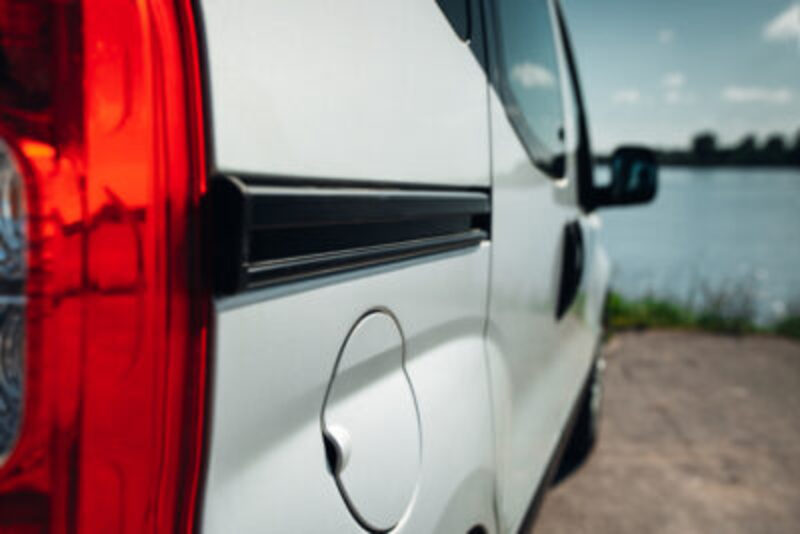
Very good article. Good info, well-written. Would like to learn more especially about renting an efficient, high mileage B camper. Who offers the best renting deal? Where is the best place to look for a low mileage used B camper that is for sale?